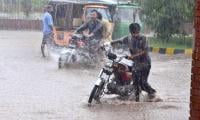HYDERABAD: Ramjee Kolhi, a young farmer is among dozens of others, who have found a hard way to survive by scavenging the damaged pieces of chillis that washed up on the rocks around the floodplain, near Jhudo town, Mirpurkhas District, Sindh province.
These chillis are most probably from the fields that were deluged by the monster monsoon rains recently.
“The floodwater might have brought these pieces of chilli here for us,” Kolhi said. His is originally a farming family from near Kunri, the largest market of chilli in Umerkot district.
“I have lost my chilli crop, standing on three acres of land. The first spell of downpour hit us on June 24, 2020. The crop is submerged ever since,” he said.
Kolhi said just like other people, his family also had to move to a safer place, near Naukot.
“I have come here to see my relatives, who are also facing the same situation. They have advised me to collect these discarded chillis from rocks to sell them in the local market to earn some amount,” he said.
“I am doing this for many days, staying the whole day here and collecting this refuse of a product in a plastic bag to sell for Rs100—150.”
Khastoori, an old woman, also collecting the similar damaged chillis from the rocks in an even larger plasatic bag, said, “These broken chillis might have floated from the fields after the flood. We collect these pieces from rock for making some money to survive,” she said.
Muhammad Ali, a local activist, said, “They are farmers, who have lost their valuable crops in the rains and floods. Now they collect these muddied as well rotting pieces of this fruit of the plants from the genus Capsicum to make their time purposeful. They earn too little to have two meals a day by selling this waste”.
“These people have chosen this activity just for survival at this difficult time. Otherwise they are hard working farmers and could have started working as daily-wage labourers to feed their families,” he said.
Ali believes the water level is rising daily, bringing more pieces of chilli and some other valuable items, to the ground.
Travelling by the main road, it was visible that the entire area, including valuable crops and houses, has been inundated, forcing the dwellers to search livelihood on the rocks.
Hundreds of families, mostly farmers displaced from Naukot, Jhudo, Tando Jan Muhammad, Dighri, and other areas have come to live together at roadsides, railway tracks and embankments of the drain, finding these places safer for living and waiting for help.
Crops of cotton, chilli, and sugarcane standing on hundreds of thousands of acres have been destroyed by the rains. Only a few families can be seen picking cotton and chillis from flooded fields for sell in the local market to earn little amount.
It is another challenge for farmers that the value of cotton and chilli coming from flooded area to the market has declined and traders are offering little amount to buy.
Some women and men were seen taking grasses from the marooned fields for their animals.
Magan Kolhi belongs to a worker family, living on the same roadside under the similar conditions, said, “We work as labourers, picking cotton, chilli, and peeling sugarcane to make both ends meet; however, now all the crops along are under water”.
“You can’t even imagine how vulnerable and miserable our lives are living on the roadside without work or help for so many weeks. We do not have any access to safe drinking water and food.”
“We are 70 families belonging to the same locality, but the rain flood has forced us to live separately,” Megan said.
Ghulam Hussain Khaskheli, a grower of Village Juma Khaskheli near Naokot, said his family had cultivated chilli on their entire 22 acres of land, hoping to make some subsistence, but floodwater did not leave anything for us to sell. “The people of the village comprising around 150 families have left their abodes hurriedly, for safer places, without taking anything with them as they chose to save their lives.”
“I don’t know how many villages were hit by rains that caused displacement and destruction everywhere. I know the severity of displacement, as our relatives and neighbours have shifted to Naukot and other areas for safety,” Khaskheli said.
Presently, Naokot is the center where hundreds of families have come to stay leaving their makeshift abodes on the sand dunes.
“I do not believe it to be a natural calamity. It is a manmade disaster, because the authorities preferred to build artificial drains, instead of rehabilitating old natural waterways.”
“These drains, having a capacity of 4,000-4,500 cusecs, are currently carrying over 7,000 cusecs of water, raising the risks of breaches,” Khaskheli said.
“I know old waterways, including famous Dhoro Puran and Hakro River used to carry entire rainwater, causing no problems for agriculture economy and infrastructure,” he said.
Prof Javed Atta, a college teacher at Tando Jan Muhammad Degree collage, said, “The bypass along the town might have stopped the flood water”. “Otherwise, the authorities have blocked natural waterways, putting all the towns and villages in the way of the flood.”
Atta said mounting water level had breached the artificial drains at many places and their waters were flowing into the area covering around 15-16 kilometers. “Presently, the water level is five-six feet, but it is still rising and may flood the town further.”
The professor said around 400-500 people took part in building this dyke by sand bags to stop the water from entering the town and its surroundings on the self-help basis.
Tando Jan Muhammad town is a famous trade center of around 35,000 people.
“Our college is situated at the mouth of waterways. Thus, we seem vulnerable because water level is rising daily,” Atta said.
Jumo Bheel, a farmer supervising 18-member team, filling sand-filled gunny bags to strengthen the bank to avoid any breach, said, “We are staying watchful here for 24 hours to monitor it”. “Some growers extended helping hand, mobilising people to strengthen the dyke for their own safety,” Bheel said, adding, “It is all about our own safety, as we are the residents of this town”.
A trader can be seen at the Pakistan Stock Exchange building in Karachi. — PPI/FilesKARACHI The Pakistan Stock...
Engro Fertilizers Limited plant can be seen in this undated image. — LinkedIn/Engro Fertilizers Limited KARACHI:...
A representational image of a chemist looking for medicines in his store. — AFP/FileLAHORE: The Pakistan...
This image shows the SRB logo on a wall inside the building. — Facebook/Sindh Revenue Board, Government of...
This image shows the Logo of UBL at the building. — Facebook/UBL - United Bank Ltd/FileKARACHI: United Bank Limited...
IMF headquarters in Washington. — AFP/FileWASHINGTON: The International Monetary Fund urged countries on Wednesday...







